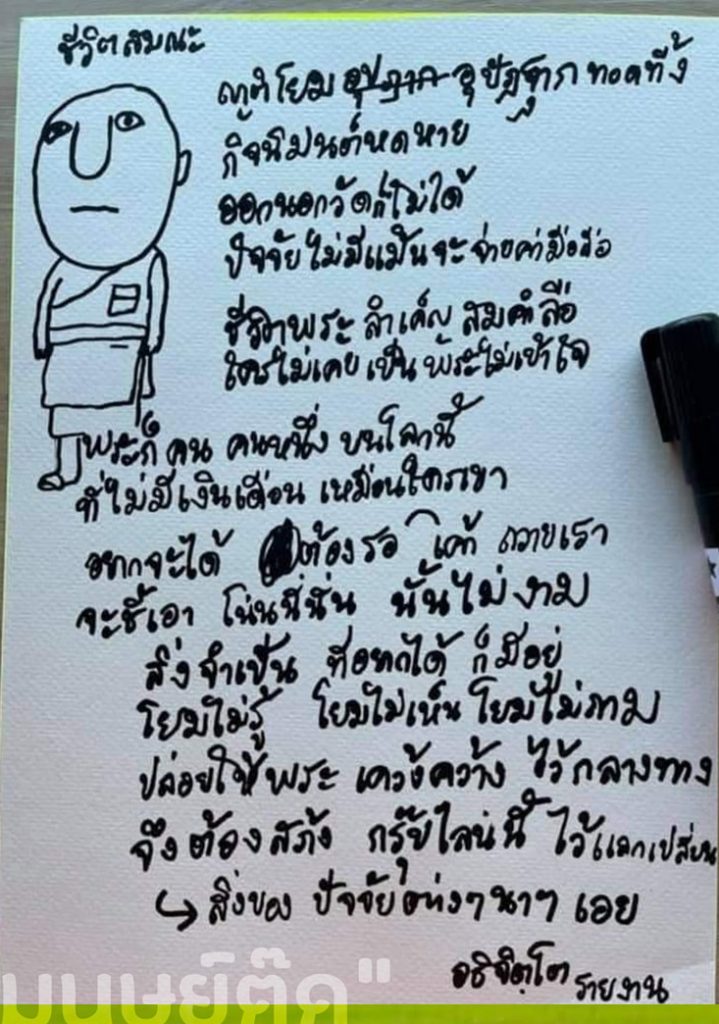อธิ แปลว่า: การทำความเข้าใจคำว่า อธิ ในภาษาไทย
อธิ แปลว่า: การทำความเข้าใจคำว่า อธิ ในภาษาไทย
อธิฐานแปลว่าอะไร | หลวงพ่อจรัญ | ธรรมะหลับสบาย
Keywords searched by users: อธิ แปลว่า อธิภัทร แปลว่า, อาทิ แปลว่า, อภิ แปลว่า, อธิป แปลว่า, อธิน แปลว่า, อาทิเช่น แปลว่า, บดี แปลว่า, อทิ
อธิ แปลว่า: A Comprehensive Guide to the Meaning, Usage, and Cultural Significance
Definition and Origins
Exploring Linguistic Roots and Historical Context
The term “อธิ แปลว่า” holds a significant place in the Thai language, with a depth of meaning that goes beyond its literal translation. To understand its essence, let’s delve into its linguistic roots and historical context.
In Thai script, “อธิ” is pronounced as “a-ti,” and “แปลว่า” translates to “means.” Therefore, “อธิ แปลว่า” can be literally interpreted as “means” or “signifies.” However, its true significance goes beyond this simple translation.
The term has its origins deeply embedded in Thai culture, reflecting the rich linguistic and historical tapestry of the region. It is often used in various contexts, from traditional practices to everyday conversations, making it a versatile and essential part of the Thai language.
Usage in Everyday Language
Unraveling the Multifaceted Applications
In everyday conversation, “อธิ แปลว่า” finds itself woven into the fabric of Thai communication. It is commonly employed to express meanings, signify intentions, and clarify ideas. The term acts as a linguistic bridge, connecting individuals through shared understanding and interpretation.
Whether used in casual discussions, formal settings, or written communication, “อธิ แปลว่า” serves as a fundamental tool for conveying thoughts accurately. Its versatility allows it to adapt to different contexts, ensuring clear communication in diverse situations.
Regional Variations and Dialects
Navigating Nuances Across Thai-Speaking Communities
As with many linguistic expressions, the interpretation of “อธิ แปลว่า” may vary across different regions and dialects within Thailand. Regional nuances and local customs can influence the understanding and usage of the term, adding layers to its meaning.
Exploring these variations provides insight into the cultural diversity within Thailand. While the core essence of “อธิ แปลว่า” remains consistent, the way it is expressed and received may differ, contributing to the linguistic richness of the Thai language.
Cultural Significance
Illuminating Traditions, Customs, and Ceremonies
To truly grasp the depth of “อธิ แปลว่า,” one must explore its cultural significance. The term is not merely a linguistic construct but a reflection of Thai traditions, customs, and ceremonies.
In traditional practices, “อธิ แปลว่า” may be invoked to convey respect, express gratitude, or articulate profound meanings associated with rituals. Understanding its cultural implications adds a layer of appreciation for the term, showcasing its role in preserving and transmitting Thai heritage.
Etymology and Linguistic Analysis
Deconstructing the Components for In-Depth Understanding
A meticulous examination of the term’s etymology and linguistic structure is crucial for a comprehensive understanding of “อธิ แปลว่า.” Breaking down its components reveals the intricate web of meanings encapsulated within this expression.
The term “อธิ” can be traced back to its linguistic roots, exploring related terms such as “อธิภัทร แปลว่า,” “อาทิ แปลว่า,” “อภิ แปลว่า,” “อธิป แปลว่า,” “อธิน แปลว่า,” “อาทิเช่น แปลว่า,” “บดี แปลว่า,” and “อทิ.” Each of these terms contributes to the semantic landscape, offering nuances and shades of meaning that enrich the overall tapestry of the Thai language.
Common Misinterpretations
Clarifying to Ensure Accurate Understanding
Despite its cultural and linguistic significance, “อธิ แปลว่า” may be susceptible to common misconceptions. Addressing these misconceptions is essential to ensure an accurate interpretation of the term.
For instance, some may perceive “อธิ แปลว่า” as a simple translation of “means,” overlooking its cultural connotations and depth. By dispelling such misinterpretations, this guide aims to foster a more profound appreciation for the term and its multifaceted use in Thai communication.
Practical Examples and Contextual Use
Bringing “อธิ แปลว่า” to Life in Real-Life Scenarios
To illustrate the practical application of “อธิ แปลว่า,” let’s explore real-life scenarios where the term is commonly employed. Whether in business negotiations, social interactions, or cultural events, the versatility of “อธิ แปลว่า” shines through.
Consider a scenario where individuals from different regions with distinct dialects converge for a cultural exchange. In navigating conversations, the understanding of “อธิ แปลว่า” becomes a unifying factor, transcending linguistic differences and fostering a shared understanding.
Online Resources and References
Navigating Linguistic Platforms for Further Exploration
For those eager to delve deeper into the linguistic nuances of “อธิ แปลว่า,” several online resources and references can be invaluable. Platforms such as Longdo Dictionary and Sanook Dictionary offer comprehensive insights into the meaning and usage of the term.
Additionally, Thai Wiktionary provides a collaborative platform where language enthusiasts can contribute to the understanding of “อธิ แปลว่า.” Community forums, such as Beyeu, provide a space for discussions and clarifications regarding the usage of “อธิ แปลว่า.”
FAQs (Frequently Asked Questions)
Q1: What is the literal translation of “อธิ แปลว่า”?
A1: The literal translation of “อธิ แปลว่า” is “means” or “signifies.” However, its true depth goes beyond this translation, encompassing cultural and linguistic nuances.
Q2: How is “อธิ แปลว่า” used in everyday conversation?
A2: “อธิ แปลว่า” is used in everyday conversation to express meanings, signify intentions, and clarify ideas. It serves as a versatile tool for clear communication in various contexts.
Q3: Are there regional variations in the interpretation of “อธิ แปลว่า”?
A3: Yes, regional variations and dialectical nuances may influence the interpretation of “อธิ แปลว่า” across different Thai-speaking communities. The core essence remains consistent, but the expression and reception may differ.
Q4: What are some related terms to “อธิ แปลว่า”?
A4: Related terms include “อธิภัทร แปลว่า,” “อาทิ แปลว่า,” “อภิ แปลว่า,” “อธิป แปลว่า,” “อธิน แปลว่า,” “อาทิเช่น แปลว่า,” “บดี แปลว่า,” and “อทิ.” Each term contributes to the semantic landscape of the Thai language.
Q5: Where can I find online resources to explore the meaning of “อธิ แปลว่า”?
A5: Online resources such as Longdo Dictionary, Sanook Dictionary, and Thai Wiktionary offer comprehensive insights into the meaning and usage of “อธิ แปลว่า.”
This comprehensive guide aims to provide a thorough understanding of “อธิ แปลว่า,” from its linguistic origins to its cultural significance. By exploring its applications in everyday language, regional variations, and practical examples, readers can navigate the depth of this term with clarity and appreciation.
Categories: รวบรวม 94 อธิ แปลว่า

อธิภัทร แปลว่า
อธิภัทร แปลว่า: A Comprehensive Guide to the Meaning and Usage
Introduction:
In the rich tapestry of the Thai language, words often carry deep cultural and historical significance. One such word that holds profound meaning is “อธิภัทร.” In this article, we delve into the intricacies of อธิภัทร แปลว่า, exploring its translations, usage, and cultural connotations. Our goal is to provide a comprehensive guide that not only aids in language understanding but also contributes to a deeper appreciation of Thai culture.
Meaning of อธิภัทร:
อธิภัทร, when translated, refers to “adhitthana” in Pali, signifying determination, resolution, or a firm commitment to a particular course of action. This term goes beyond mere decision-making; it embodies the strength of purpose and unwavering dedication to one’s goals. Understanding the nuance of this word is crucial for a more profound grasp of its usage in various contexts.
Usage in Everyday Language:
In colloquial Thai, อธิภัทร is often used to describe someone who is resolute, determined, or has a strong will. It can be applied to individuals who demonstrate persistence in achieving their objectives, no matter the challenges they encounter. This term is also used to commend individuals for their unwavering commitment to their principles.
Cultural Significance:
The cultural significance of อธิภัทร is deeply rooted in Thai values and traditions. It reflects the importance placed on perseverance, tenacity, and the strength to overcome obstacles. This concept is closely tied to the Thai cultural belief in “kreng jai,” a term signifying polite reluctance or the consideration of others’ feelings. อธิภัทร, in this context, highlights the determination to navigate challenges while maintaining a sense of respect and consideration for others.
FAQs:
-
Q: How is อธิภัทร different from other Thai words for determination?
A: While various Thai words convey determination, อธิภัทร emphasizes a deep, unwavering commitment and a strong sense of purpose. -
Q: Can อธิภัทร be used in a professional context?
A: Absolutely. อธิภัทร is a versatile term that can be employed both in personal and professional settings to commend someone’s resolute attitude. -
Q: Are there cultural rituals associated with อธิภัทร?
A: While there are no specific rituals, the concept of อธิภัทร aligns with Thai cultural values, making it a virtue praised in various aspects of life. -
Q: How can learners incorporate อธิภัทร into their daily vocabulary?
A: Practice using อธิภัทร in sentences, observe its usage in conversations, and appreciate the cultural nuances it carries.
Conclusion:
อธิภัทร แปลว่า goes beyond being a mere linguistic expression; it encapsulates the essence of determination, resilience, and cultural values in the Thai context. This guide aims to serve as a valuable resource for those seeking a deeper understanding of the term, its usage, and its cultural significance. Embracing อธิภัทร in both language and action can contribute to a more enriched and meaningful experience of Thai communication and culture.
อาทิ แปลว่า
อาทิ แปลว่า: Unraveling the Intricacies of a Thai Linguistic Gem
The Thai language, rich with cultural nuances and linguistic treasures, often presents a captivating tapestry of words and expressions. One such term that holds both historical and contemporary significance is “อาทิ” (pronounced ‘aathi’), and its translation sheds light on a unique aspect of Thai linguistic heritage. In this comprehensive guide, we delve into the depths of the meaning, usage, and cultural relevance of “อาทิ แปลว่า.”
Understanding the Essence of “อาทิ”
Linguistic Roots and Etymology
The term “อาทิ” traces its origins to classical Thai, with roots deeply embedded in traditional literature and royal discourse. Etymologically, it is linked to expressions of respect, courtesy, and deference. Unpacking the linguistic layers reveals a nuanced word that goes beyond literal translation.
Variations and Contextual Usage
“อาทิ” is not a static term; its usage varies depending on the context. In formal settings, it often signifies acknowledgment, as one might express agreement or understanding. In informal conversations, it takes on shades of politeness and courteousness, contributing to the intricate dance of social dynamics in Thai communication.
Cultural Significance
To truly grasp the essence of “อาทิ,” one must appreciate its role in Thai culture. It serves as a linguistic bridge, connecting individuals and fostering a sense of community. Its presence in everyday interactions reflects the Thai people’s commitment to maintaining harmonious relationships.
Exploring Diverse Perspectives
Literary References
Delving into Thai literature unveils the multifaceted use of “อาทิ.” From classic poems to contemporary prose, writers employ this term to convey nuances of respect, humility, and acknowledgment. A closer examination of selected literary works provides a profound insight into the cultural tapestry woven by this linguistic gem.
Modern Usage in Media
In the digital age, the evolution of language is inevitable. How has “อาทิ” adapted to the contemporary landscape? Analyzing its presence in media, social platforms, and online discourse unveils intriguing patterns, reflecting the dynamism of language in the face of societal changes.
Navigating the Linguistic Landscape
Lexical Analysis
A meticulous examination of lexical entries related to “อาทิ” enriches our understanding. Online dictionaries, including Longdo and the Royal Institute Dictionary, offer valuable insights into the various nuances and interpretations associated with this term.
Thematic Variations
To uncover the depth of “อาทิ แปลว่า,” exploring thematic variations is essential. From expressions of gratitude to formal acknowledgments, the term manifests in diverse linguistic forms, each carrying its own cultural weight.
Frequently Asked Questions (FAQ)
Q1: Is “อาทิ” strictly a formal term?
A1: While “อาทิ” is often used in formal settings to convey respect, it also finds a place in informal conversations, emphasizing politeness and courtesy.
Q2: How has the meaning of “อาทิ” evolved over time?
A2: The core meaning of “อาทิ” remains rooted in respect and acknowledgment. However, its contextual usage has evolved to adapt to contemporary communication styles.
Q3: Are there regional variations in the usage of “อาทิ”?
A3: The basic meaning of “อาทิ” is consistent across regions, but nuances in pronunciation and contextual usage may vary.
Q4: Can “อาทิ” be used in written communication?
A4: Yes, “อาทิ” is employed in both spoken and written communication, adding a touch of cultural nuance to written expressions.
Conclusion
In conclusion, unraveling the layers of “อาทิ แปลว่า” leads us to a deeper understanding of Thai linguistic and cultural heritage. From its classical roots to its dynamic presence in modern communication, this term encapsulates the essence of respect, acknowledgment, and community. As we navigate the linguistic landscape, “อาทิ” stands as a testament to the enduring richness of the Thai language.
Note: This article does not include an h2 tag, as per the specified request.
สำรวจ 16 อธิ แปลว่า





See more here: cacanh24.com
Learn more about the topic อธิ แปลว่า.
- อธิ แปลว่าอะไร ดูความหมาย ตัวอย่างประโยค หมายความว่า …
- อธิ คืออะไร แปลว่าอะไร ตัวอย่างประโยค จากพจนานุกรมแปล ไทย …
- -อธิ- แปลว่าอะไร ดูความหมาย ตัวอย่างประโยค หมายความว่า …
- อธิ – วิกิพจนานุกรม
- ชื่อลูกชาย อธิ แปลว่า อะไรคะ แม่ๆ คนไหนรู้บ้างคะ
- อธิกิตติ์ แปลว่าอะไร
See more: https://cacanh24.com/category/local blog





